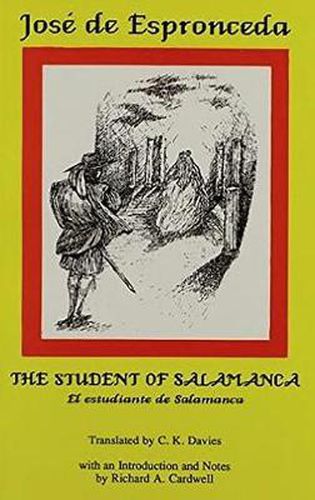Readings Newsletter
Become a Readings Member to make your shopping experience even easier.
Sign in or sign up for free!
You’re not far away from qualifying for FREE standard shipping within Australia
You’ve qualified for FREE standard shipping within Australia
The cart is loading…






In this impressive ‘verse legend’ Espronceda creates an original interpretation of the famous Don Juan legend whereby he produces a Romantic ‘counter-text’ which gives voice to what we now recognise as a central part of the modern philosophical condition: the Romantic vision of an all-pervasive cosmic injustice. Professor Cardwell, in his introduction, shows how in the person of Felix de Montemar, Espronceda has created one of Europe’s first rebellious literary heroes, standing alone, noble and defiant, in the face of all the evil and pain in the world. Thus Espronceda takes his place alongside other major European Romantic writers Byron, Lermontov, Heine, Vigny, Leopardi and Mickiewitz expressing, as they do, man’s existential protest, noblest ideals and his modern sense of human condition which directly informs our own twentieth century literary achievements. Keith Davies’ meticulous translation of this poem, mirroring the metrical and stylistic virtuosity of Espronceda’s original, presents it for the first time to English readers, since its composition 150 years ago.
$9.00 standard shipping within Australia
FREE standard shipping within Australia for orders over $100.00
Express & International shipping calculated at checkout
In this impressive ‘verse legend’ Espronceda creates an original interpretation of the famous Don Juan legend whereby he produces a Romantic ‘counter-text’ which gives voice to what we now recognise as a central part of the modern philosophical condition: the Romantic vision of an all-pervasive cosmic injustice. Professor Cardwell, in his introduction, shows how in the person of Felix de Montemar, Espronceda has created one of Europe’s first rebellious literary heroes, standing alone, noble and defiant, in the face of all the evil and pain in the world. Thus Espronceda takes his place alongside other major European Romantic writers Byron, Lermontov, Heine, Vigny, Leopardi and Mickiewitz expressing, as they do, man’s existential protest, noblest ideals and his modern sense of human condition which directly informs our own twentieth century literary achievements. Keith Davies’ meticulous translation of this poem, mirroring the metrical and stylistic virtuosity of Espronceda’s original, presents it for the first time to English readers, since its composition 150 years ago.